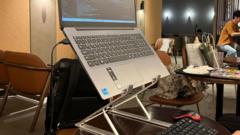In the affluent neighborhood of Daechi, Seoul, café owner Hyun Sung-joo faces a common challenge: students determined to study for hours on end. Known locally as "Cagongjok," these young South Koreans tend to turn coffee shops into their personal study spaces, often to the detriment of other customers hoping for a casual coffee outing. Hyun recounts a recent instance where one customer occupied a full day with two laptops and a six-port power strip, compelling him to restrict access to power outlets to maintain balance.
This phenomenon of occupying space has become increasingly prevalent in South Korea since the rise of coffee culture in the last decade. Starbucks Korea has taken notice and instituted new policies to minimize any negative impact from extreme cases of excessive equipment setups or unattended tables. While they emphasize that staff will not ask customers to leave, recent guidelines aim to foster a more comfortable environment, responding to theft incidents involving abandoned belongings.
A Thursday evening at a Starbucks in Gangnam illustrates the typical scene: students, including an 18-year-old preparing for the university entrance exam, engrossed in their studies from morning until late at night, occasionally leaving their devices unattended while they grab meals. Although no significant instances of bulky equipment were reported after the guideline changes on August 7, Starbucks acknowledged that monitoring the impact of these restrictions remains challenging.
Patrons have mixed feelings about Starbucks' new policies. While many who seek a social atmosphere welcome the initiative as a necessary adjustment to traditional café dynamics, others perceive it as a heavy-handed approach. Some argue that the vibrant ambiance of cafes should provide a balance for both studying and socializing.
As the number of cafés in South Korea grows—seeing a 48% increase within five years—community discussions surrounding "Cagongjok" have intensified. Hyun reflects that while most customers respect the shared space, there are occasional outliers requiring intervention to keep the peace. Other cafés have embraced different strategies, such as designating "No Study Zones," which impose time limits on studying to preserve seating for casual diners.
For some patrons, especially those from challenging backgrounds, the café offers companionship and a sense of belonging absent in libraries or other study zones. Yu-jin Mo emphasizes the emotional comfort found in cafes, attributing her attachment to spaces that felt safe during her childhood.
Professor Choi Ra-young from Ansan University suggests that the rise of "Cagongjok" reflects deeper societal pressures on South Korea's youth, emphasizing the need for inclusive spaces that encourage productive study without inconveniencing others. Advocates like her urge for a more thorough integration of café culture with supportive policies to enhance the experience for all users.

















